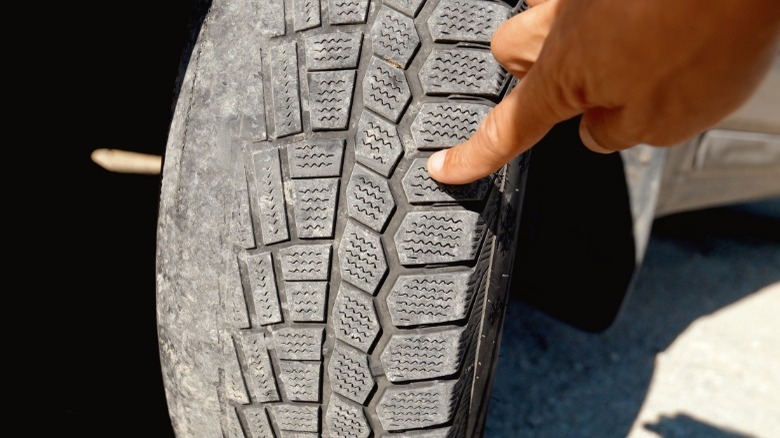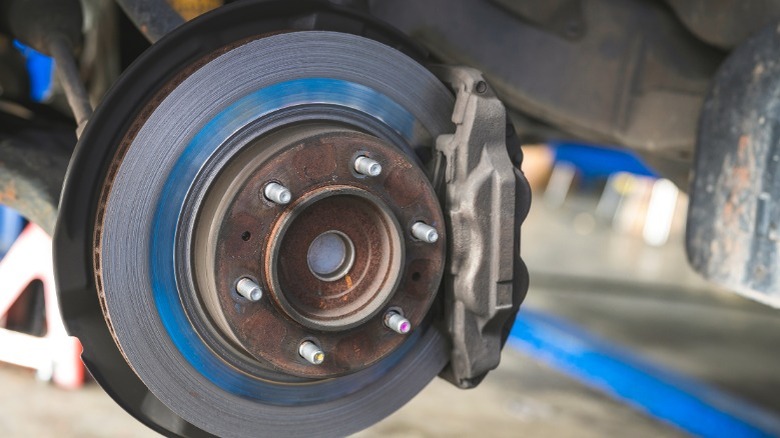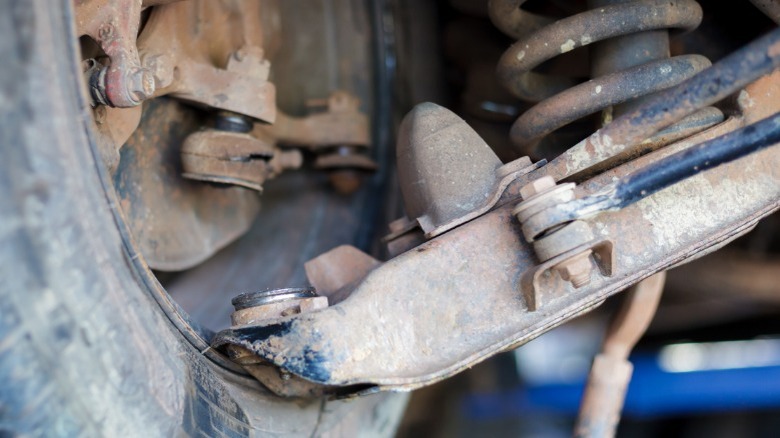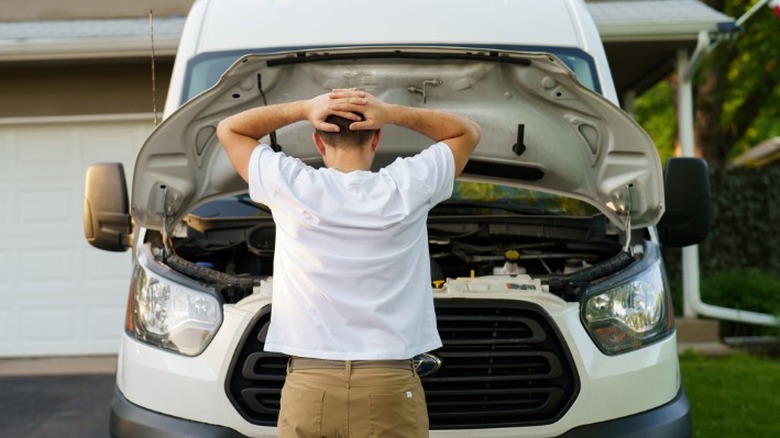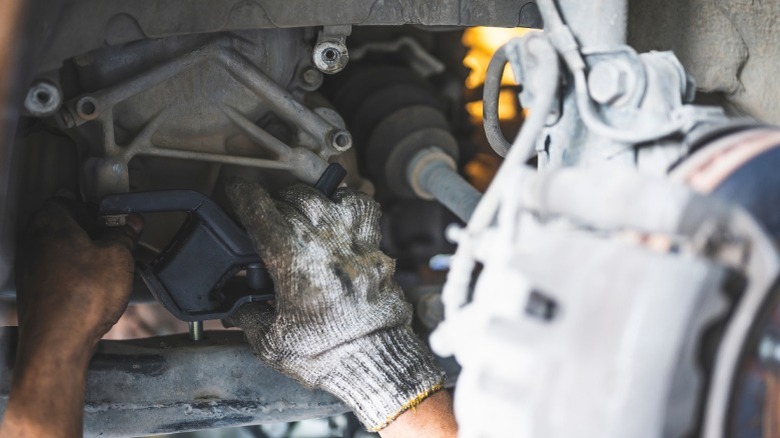5 Reasons Why Your Car Shakes On The Highway
Driving a modern car exposes us to a lot of scary situations, including things like accidents, inclement weather, mechanical malfunctions, and even the erratic behavior of our fellow motorists. All of those things are scary enough while cruising through your neighborhood, but they become increasingly terrifying while driving at highway speeds. We can avoid some of those problems by carefully planning our commute, and we can practice safe driving habits to minimize our chances of an accident or an argument with other drivers. However, one thing that's more difficult to predict and avoid is a mechanical malfunction, and one of the scariest mechanical problems to face while driving on the highway is shaking.
That's because excessive shaking or vibrations can cause us to lose control of the vehicle, especially when driving at high speeds on the interstate. The problem is that various mechanical malfunctions can cause your car to shake on the highway, and the issue may present itself in diverse forms. For example, you may experience violent shaking only while braking, or it may come and go as you accelerate.
With that said, diagnosing the problem usually requires a test drive and a professional inspection. However, learning some of the most common reasons why a car might shake on the highway can help you understand the issue better, and it may even help you to diagnose the problem yourself without a trip to the repair shop. As a former professional mechanic, I'll break down the most common causes of shaking on the highway, and I'll even touch on some of the potential fixes. So, from tire problems to worn-out suspension components and more, here are five common reasons why your car shakes on the highway.
Tire and wheel issues
Two of the most common culprits of vehicle shaking at highway speeds are tire and wheel problems. These issues generally take the form of either uneven tire wear or improper wheel alignment, but they can also be caused by tire and wheel damage unrelated to alignment or wear patterns. That said, in many cases, all of these problems are connected to each other. For example, poor wheel alignment is one of the top causes of uneven tire wear, which then leads to things like shaking at high speeds or a bumpy, uncomfortable ride, as well as potential blowouts. On the other hand, poor or incorrect alignment can also cause shaking on its own, and it may be the result of hitting a pothole or worn-out and damaged parts. Finally, highway shaking can also be caused by things like tires that are extremely old or damaged and bent or cracked wheels.
As you can see, wheel and tire issues cover a large group of problems, and that's one of the reasons why it's so important to maintain your wheels and tires properly. Regular alignment checks, as well as tire rotations and balancing services are key to a smooth, comfortable, and safe ride. If your car shakes on the highway, and you suspect an alignment, wheel, or tire issue, you should visit your local repair shop as soon as possible. Potential fixes for these issues include things like performing a front-end wheel alignment, replacing your tires, fixing or replacing damaged parts, or rotating and balancing the tires.
Brake problems
Another extremely common cause of vehicle shaking on the highway is a brake problem. The issue occurs when brake pads, shoes, drums, or rotors become damaged or warped, resulting in their inability to sit properly against each other. To help you understand this problem a little more clearly, it may be helpful to explain briefly how automotive brakes work.
The two primary types of brakes you'll encounter on modern cars are disc brakes and drum brakes. While they differ in a few ways, both brake types rely on hydraulic pressure and friction to stop your car. The friction is the result of hydraulic pressure pushing a brake pad or shoe into contact with a metal rotor or drum. When your brakes are in good condition, the pad, shoe, rotor, and drum surfaces should all be flat and level, allowing the components to create friction while sliding past one another. However, over time — due to malfunctions and user errors — brake pads, shoes, rotors, and drums can become scored or warped. When that happens, not only will your brake system do a worse job of stopping the car, but the uneven surfaces can cause intense vibration as they slide past each other, especially at high speeds.
If your brakes are causing your car to shake, you'll most likely only experience the problem while pressing the brake pedal. The shaking will probably be more extreme at highway speeds, but, depending on the severity of your brake issue, you may feel it while cruising around town, too. Generally, the fix for this problem is relatively simple: replace the brake pads or shoes and resurface or replace the rotors or drums.
Worn-out suspension and steering components
Your car's suspension system is responsible for supporting the vehicle's weight, helping to absorb and control shocks, and maintaining a smooth, comfortable ride. It works closely with the steering system, and many suspension components can be classified as part of both groups. These systems include things like shocks and struts, ball joints, tie rods, control arms, axles, and more. These are durable parts of your vehicle, thanks to their immense responsibility and the harsh conditions to which they're subjected. However, over time or due to accidents and rough driving conditions, suspension and steering system components can wear out or break. When that occurs, you're likely to experience a wide range of issues, including shaking on the highway.
That's because the suspension plays a critical role in your car's ride quality and handles everything from absorbing shocks and vibrations to transferring engine power to the wheels and maintaining lateral stability. The suspension and steering systems are also where you find the adjustment points for wheel alignment, meaning that a suspension or steering problem can throw off your vehicle's alignment. Basically, a damaged or worn-out suspension or steering system component can cause shaking for a variety of different but connected reasons.
Remember how we said that shaking at high speeds can be difficult to diagnose? Well, now you're starting to understand why. The good news is that a skilled technician should be able to identify damaged suspension or steering system components relatively easily. The bad news is that these parts can be pricey to replace — plus, almost anytime you work on the suspension or steering system, you have to realign the vehicle, meaning that you'll probably have to pay for whatever repair or replacement is necessary and an alignment after those repairs are finished.
Engine problems
Another relatively common cause of vehicle shaking is engine damage. Engine malfunctions and damage can take the form of various different conditions, though, so we'll cover a few of the most common issues that can cause shaking and how to identify them. One of the most common engine problems that can cause your car to shake is a damaged or worn-out engine mount. Depending on the make and model, your car has between two and four engine mounts.
Their job is to support the motor, prevent excessive engine movement, and absorb shocks. Over time, these mounts can fail, and when that happens, your engine will likely bounce and jostle around, resulting in some pretty jarring vibrations and shakes. Identifying faulty or worn-out mounts typically involves a visual inspection. Things like cracks in the rubber, bent brackets, or a shaking engine while the car is running can all indicate bad mounts.
Outside of bad engine mounts, a few other issues can cause your car to shake on the highway. Broken parts, like radiator fans, can be to blame, especially if you only notice the issue after your engine is warmed up. If you notice the shaking while accelerating, the problem could be caused by an engine misfire. An engine misfire is more likely to be the culprit if the shaking is accompanied by other problems, like a drop in power. Other engine malfunctions that may cause shaking include things like a faulty or worn-out harmonic balancer or even a bad engine air filter. The fixes for most of these problems require us to replace or repair the faulty component. In the case of engine misfires, many issues can cause the problem, but it's frequently caused by bad spark plugs.
Transmission issues
Transmission problems represent another issue that can cause your car to shake on the highway. Just like the engine, your transmission relies on mounts to keep it stable, prevent excess movement, and absorb shocks. While transmission mounts are highly durable and designed to last for many years of driving, it's not uncommon for these components to wear out or fail after around 60,000 to 100,000 miles. When that happens, you'll likely experience a few unpleasant symptoms, including things like difficulty shifting gears, clunking noises while shifting, and excessive vibration.
Besides broken mounts, various other transmission problems can cause your car to shake on the highway. The issue is that it can be difficult to diagnose internal transmission damage without an inspection. Modern transmissions are complex and full of small parts that work together in a precise way to spin your wheels. If one of those components breaks, it can cause a ripple effect leading to more severe issues, as well as a lot of potential shaking on the highway.
As is the case with most of the other issues covered here, if your car is shaking because of a transmission problem, you'll need to replace the faulty part. That may be as simple as replacing worn-out mounts, or it may require a complete teardown and rebuild of the gearbox. Remember, vehicle shaking can be caused by many different issues. If you experience the problem yourself, you should visit a mechanic as soon as possible for an inspection. Doing so at your earliest convenience can help you address the issue before it turns into something more severe and expensive to repair.

